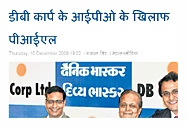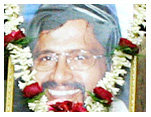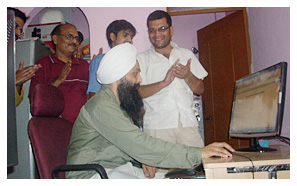 कई प्रदेशों में दैनिक भास्कर समेत कई नामों से अखबार प्रकाशित करने वाली कंपनी डीबी कार्प लिमिटेड द्वारा लाए गए आईपीओ को फर्जी बताने वाली जनहित याचिका पर इलाहाबाद हाईकोर्ट की लखनऊ खंडपीठ ने फैसला दे दिया है। फैसले की एक प्रति भड़ास4मीडिया के पास भी है। इसे हम अपने पाठकों के लिए हू-ब-हू प्रकाशित कर रहे हैं। यहां बता दें कि अदालत के फैसले का लब्बोलुवाब ये है कि जनहित याचिका (पीआईएल) दायर करने वाली पार्टी (डा. सियाराम जायसवाल एंड अदर्स) के पास इस मामले को सेबी के पास ले जाने के विकल्प खुले हैं। कोर्ट ने आईपीओ आने के ठीक एक दिन पहले इस याचिका को दायर किए जाने को भी संज्ञान लिया है और इतने कम वक्त होने का भी उल्लेख किया है। कोर्ट ने याचिका को डिस्पोज तो कर दिया लेकिन याचिकाकर्ताओं को कई विकल्प भी सुझाए हैं। पूरा फैसला इस प्रकार है…
कई प्रदेशों में दैनिक भास्कर समेत कई नामों से अखबार प्रकाशित करने वाली कंपनी डीबी कार्प लिमिटेड द्वारा लाए गए आईपीओ को फर्जी बताने वाली जनहित याचिका पर इलाहाबाद हाईकोर्ट की लखनऊ खंडपीठ ने फैसला दे दिया है। फैसले की एक प्रति भड़ास4मीडिया के पास भी है। इसे हम अपने पाठकों के लिए हू-ब-हू प्रकाशित कर रहे हैं। यहां बता दें कि अदालत के फैसले का लब्बोलुवाब ये है कि जनहित याचिका (पीआईएल) दायर करने वाली पार्टी (डा. सियाराम जायसवाल एंड अदर्स) के पास इस मामले को सेबी के पास ले जाने के विकल्प खुले हैं। कोर्ट ने आईपीओ आने के ठीक एक दिन पहले इस याचिका को दायर किए जाने को भी संज्ञान लिया है और इतने कम वक्त होने का भी उल्लेख किया है। कोर्ट ने याचिका को डिस्पोज तो कर दिया लेकिन याचिकाकर्ताओं को कई विकल्प भी सुझाए हैं। पूरा फैसला इस प्रकार है…
This is an UNCERTIFIED copy for information/reference. For authentic copy please refer to certified copy only. In case of any mistake, please bring it to the notice of Deputy Registrar(Copying).
HIGH COURT OF JUDICATURE AT ALLAHABAD, LUCKNOW BENCH
Court No.1
Writ Petition No. 11468 (MB) of 2009 (PIL)
Dr. Siya Ram Jaiswal and others
vs.
Union of India and others.
Hon’ble Pradeep Kant, J
Hon’ble R.R. Awasthi,J.
Heard the learned counsel for the parties.
This writ petition has been filed in the nature of Public Interest Litigation praying for the following reliefs:
“I. issue a writ order or direction in the nature of mandamus directing SEBI (Respondent No. 5) to prohibit Respondent No. 6 from soliciting public money for the issue of its securities in furtherance of advertisements published by it as contained in Annexure no. 4 to this writ petition.
II. issue a writ order or direction in the nature of mandamus, restraining the respondent no. 6 to proceed with its IPO in furtherance of its advertisement for the IPO as also published in Dainik Bhaskar, a copy of which is Annexure No. 4 to this writ petition.
III. issue a writ order or direction in the nature of mandamus, directing the respondents no. 1 to 5 to enquire into the ownership of the title ‘Dainik Bhaskar’ and take appropriate action against respondent no. 6 for publishing incorrect and misleading information.
IV. issue a writ order or direction in the nature of mandamus, directing the respondents no. 1 to 5 to enquire into the entire scheme of respondent no. 6 with regard to its IPO before permitting its issuance.
V. Such other/further relief, as the Hon’ble Court may deem just and appropriate in the facts and circumstances of the case, may also be granted in favour of the petitioner.
VI. Costs of the petition.”
A preliminary objection has been raised by Sri Krishna Mani, learned Senior Advocate, appearing for respondent no. 7 about the maintainability of the writ petition, both on the ground of territorial jurisdiction of this Court and also on the ground that the petitioners cannot be said to be the aggrieved persons, nor the petition can be taken into as Public Interest Litigation, as the respondent no. 7 has issued an advertisement as contained in Annexure No. 4 floating the public issue after clearance from the Securities & Exchange Board of India (SEBI) and other concerned Regulatory Bodies and, therefore, no cause of action has accrued to the petitioners to challenge the aforesaid action.
Initially, learned counsel for the petitioners Sri J.N. Mathur, Senior Advocate, submitted that unless clearance is given by the SEBI, the prospectus could not have been issued, nor the proposed issue could be opened, but on being disclosed by Sri Krishna Mani that the entire action is being taken after the clearance being given by the SEBI and other Regulatory Bodies, learned counsel for the petitioners filed a supplementary affidavit along with the copy of the order passed by the SEBI on 27.11.2009 and has also annexed the prospectus issued on 2nd December 2009.
Assailing the aforesaid order and also the action of the respondent no. 6 inviting the offers, it has been contended that in the order passed by the SEBI there are certain observations which required that the conditions mentioned in the aforesaid order be first complied with before the proposed issue can open for subscription within a period of twelve months from the date of issuance of this observation letter, but the said observations having not been carried through, in their letter and spirit, the proposed issue cannot allowed to be opened.
Another plea has been raised very emphatically viz. the respondent no. 6 is not the owner of ‘Dainik Bhaskar’ and atleast it is not clear from the prospectus as to how it claims to be the owner, when even, according to the Supreme Court judgment, they cannot be said to be the owner of ‘Dainik Bhaskar’ and, therefore, the clearance could not have been granted by SEBI unless satisfied about the aforesaid fact and accordingly, it was pleaded that incorrect information, or so to say, incomplete information has been given to SEBI, while seeking the required clearance. The argument, therefore, is that by allowing such public issue to be floated, there is every chance of public being lured to invest their money which would not be in their interest and the money would be siphoned of in the self interest of respondent no. 6 itself which may be divested to other countries.
Sri Krishna Mani strongly disputed the aforesaid plea and submitted that no incorrect information has been given to SEBI and as a matter of fact, the risk factors have been pronounced on the observations made by SEBI itself and that there is no ambiguity regarding the ownership of ‘Dainik Bhaskar’ and that the risk-factor regarding ownership has also been mentioned as per the directives issued by the SEBI. He further submitted that it was only after the draft prospectus was considered by the SEBI and the suggestion made, or so to say, the observations made by SEBI having been strictly followed that the proposed issue is to be opened as permitted by the SEBI and other Regulatory Authorities / Bodies.
Though arguments have been advanced at length in support of their respective claims by both the parties, but we find force in the argument of Sri Krishna Mani that if the petitioners feel that there is some information which has not been given to SEBI or any relevant factors have not been considered by SEBI or the clearance given by SEBI requires any scrutiny, the petitioners ought to have approached the SEBI instead of coming to the High Court straightaway with a prayer for issuing a writ in the nature of mandamus.
Sri Krishna Mani also urged that if the petitioners can be deemed to be aggrieved persons against the order passed or clearance given by the SEBI, they can file an appeal under Section 15-T of the Securities & Exchange Board of India Act, 1992, but the writ jurisdiction is not an appropriate forum and that the SEBI is the Regulatory Authority who has been given powers under the Act to look into such matters and to take appropriate action.
We have considered the arguments of both the sides and we feel that the writ petition raising the grievances as against the order/clearance given by the SEBI cannot be entertained straight-away in writ jurisdiction. The petitioners if feel aggrieved and also bona fide believe that the process adopted by the SEBI or the clearance given by it requires consideration, they are at liberty to approach the SEBI and bring to its notice the grievance/issues that they want to raise. They are also at liberty to challenge the order of the SEBI, in case they are the persons aggrieved under Section 15-T of the Act in appeal, if permissible under law.
We also take notice of the fact that the issue is to open today, i.e. 11th December 2009 and is to close on 15th December 2009 and the writ petition has come up for orders today, i.e. only one day before the aforesaid date.
We, therefore, do not find it expedient to entertain the petition, but while declining to entertain the petition, we make it open to the petitioners to approach the SEBI and espouse their cause as pleaded in the writ petition or as they may deem fit and proper and /or file an appeal, if permissible under the provisions of the Act.
We also do not find any reason that if approach is made by the petitioners, then why SEBI would not consider the issues raised.
The writ petition is disposed of accordingly.
Dated: 11.12.2009














